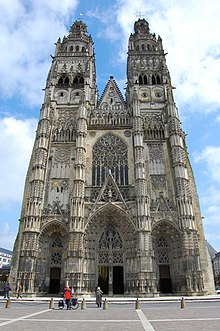Tours Cathedral
| Tours Cathedral | |
|---|---|
| Cathedral of Saint Gatianus of Tours | |
| French: Cathédrale Saint-Gatien de Tours | |
 |
|
| 47°23′44″N 0°41′40″E / 47.39556°N 0.69444°ECoordinates: 47°23′44″N 0°41′40″E / 47.39556°N 0.69444°E | |
| Location | Tours, Indre-et-Loire |
| Country | France |
| Denomination | Roman Catholic |
| Website | www |
| History | |
| Dedication | Gatianus of Tours |
| Architecture | |
| Status | Cathedral |
| Functional status | Active |
| Style | Gothic |
| Groundbreaking | 1170 |
| Completed | 1547 |
| Specifications | |
| Length | 100 metres (330 ft) |
| Width | 28 metres (92 ft) |
| Number of towers | 2 |
| Tower height | 68 metres (223 ft) (north) 69 metres (226 ft) (south) |
| Administration | |
| Parish | St. Maurice |
| Archdiocese | Tours |
| Clergy | |
| Archbishop | Bernard-Nicolas Aubertin () |
Saint Gatien's Cathedral is the Roman Catholic cathedral church of the Tours diocese and the metropolitan cathedral of the Tours ecclesiastic province, in Indre-et-Loire, France. Saint-Gatien's Cathedral was built between 1170 and 1547. At the time construction began, it was located at the south end of the bridge over the Loire, on the road from Paris to the south-west of France. It has been a classified Monument historique since 1862.
The first cathedral of Saint-Maurice was built by Lidoire, bishop of Tours from 337 to 371 (preceding St Martin). Burnt in 561, it was restored by Gregory of Tours and rededicated in 590. Its location, at the south-west angle of the castrum, as well as its eastern orientation, resulted in the original access being through the late-Roman surrounding wall (such a configuration is quite rare).
The cathedral was then rebuilt during the second quarter of the 12th century and again burnt in 1166 during the conflict between Louis VII of France and Henry II of England (also count of Anjou, the neighboring region).
The present cathedral replaces the 13th century Romanesque building. The first phase concerned the south transept and the towers, as early as 1170. The chancel was rebuilt from 1236 to 1279 by Étienne de Mortagne but the nave took much longer to build. The architect Simon du Mans rebuilt the transept and started the nave, including six spans, aisle and chapel, built during the 14th century — the first two spans correspond to those of the old Romanesque cathedral and date back to the 12th century. The nave was only finished during the 15th century by architects Jean de Dammartin, Jean Papin and Jean Durand, thanks to the generosity of Charles VII and the Duke of Brittany Jean V.
...
Wikipedia

